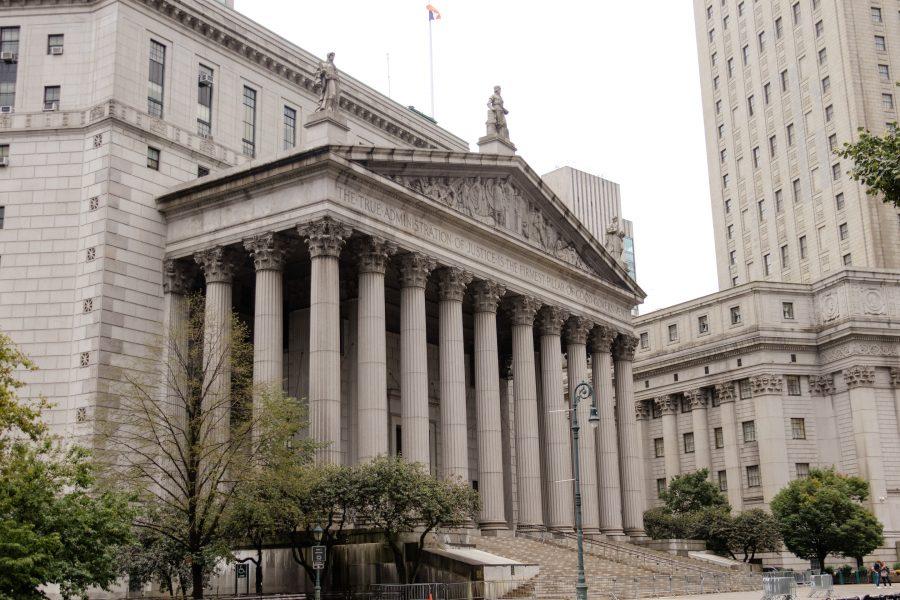After the U.S. Supreme Court heard arguments for three labor discrimination cases on the grounds of transgender identity and sexuality last week, members of NYU’s LGBTQ community expressed dread and hopelessness about the outcomes.
The court cases involve a transgender woman who was fired because her employer disapproved of her gender identity and two gay men who were fired when their sexual orientation was discovered. The plantiffs assert that their employers have violated Title VII of the 1964 Civil Rights Act, which prohibits employers from discriminating on the basis of sex, gender, ethnicity and religion. The court will only reach a decision sometime within the upcoming year, but its conservative makeup has left students feeling that the plaintiffs will not prevail.
To express anger over what he expects to be a major loss in rights for the LGBTQ community, Silver sophomore and NYU Queer Union Secretary Nick Rogers traveled to The Supreme Court on Oct. 8 and participated in a mass civil disobedience protest.
Rogers was one of hundreds bussed to Washington by the organization Housing Works –– a non-profit based in New York City that donates to charities that fight AIDS and homelessness. In Washington around 130 people from activist organizations nationwide conducted a sit-in on the street in front of the Supreme Courthouse, blocking the entry. The protestors, including Rogers, were all arrested.
“Being arrested as a trans person is very stressful,” Rogers said. “Getting deadnamed and worrying about how they’re going to treat me when they see that the name on my ID is very different from the masculine-presenting person in front of them.”
Twenty-seven states do not explicitly prohibit LGBTQ workplace discrimination; New York is one of the 23 that does.
Professor of Politics Christine Harrington said some states include sexual orientation as a trait employers cannot discriminate against — underneath the umbrella term of sex — while others solely protect against discrimination based on gender. The U.S. Equal Opportunity Employment Commission defines sex discrimination as including transgender status and sexual orientation, saying discriminating based on either of these violates Title VII.
“The congressmen writing the [Civil Rights Act of 1964] did not imagine there would be such a thing as sexual orientation,” Harrington said. “The issue that many people think was settled a while ago is the assumption that sexual orientation is a subcategory of the word sex in the statute.”
Following the retirement of former Justice Anthony Kennedy in 2018 –– who played a pivotal role in previous LGBTQ-related Supreme Court decisions –– the decision revolves around current Chief Justice John Roberts, according to Harrington.
After the appointment of Brett Kavanaugh by President Donald Trump, the Supreme Court is now at a 5 to 4 conservative majority.
“For gay marriage, it was Kennedy who swung and made it so that the liberals had a majority,” Rogers said. “But he’s gone, and he got replaced by Kavanaugh who’s hard-right, and it just shifted the entire court right.”
Rogers’ fears may be warranted, according to Harrington, who said the implications of the decision will be complex and potentially detrimental. If the Supreme Court decides LGBTQ workplace discrimination is not a violation of Title VII, it could overrule New York’s current policy.
“The question itself needs to be opened up; it’s not just a yes or no — will things be bad or will things be good — it’s really very complicated, and importantly so,” Harrington said. “Sexual orientation is part of [New York’s] equal employment opportunity law, so it would have an effect […] and that would be negative.
LS sophomore Declan Urffer said he would be surprised if anything positive came out of the cases.
“Given the current makeup of the court, I’d say things are not looking good,” Urffer said. “[With] the recent appointments that the Trump administration has made, I don’t see anything really happening.”
CAS sophomore Rachel Bell said if this case were happening two years ago, she would have been more hopeful for the results.
“This court cares way more about appeasing Trump than they do about following the constitution,” Bell said. “As much as I want to protest and fight, I feel so dejected.”
Rogers said he feels confident that if the Supreme Court were objective, it would rule in favor of the plaintiffs — but he doesn’t think that’s the case.
“The law and the facts are on our side,” Rogers said. “But they’re gonna go out of their way to be discriminatory.”
With many worried about the outcome, student morale is low. Some students said they did not feel supported by NYU, mentioning instances of deadnaming and misgendering in class, as well as the decision to keep Chick-fil-A –– which donates to anti-LGBTQ organizations –– in Weinstein Food Court.
“It feels often, especially from the people higher up, like a lip service for progressive ideas,” Rogers said. “But when it comes to actually caring, they really don’t.”
Students said they have found community in clubs instead.
Queer Union Vice President and CAS sophomore Lexie Kolberg said the court cases were discussed in great length during the most recent club meetings.
“Queer Union has been trying to plug resources for our members to educate themselves on what’s being tried at the Supreme Court,” Kolberg said. “We like to talk about it with ourselves. Sometimes, just having a sounding board who understands is really helpful.”
Email Lisa Cochran at [email protected].























































































































































